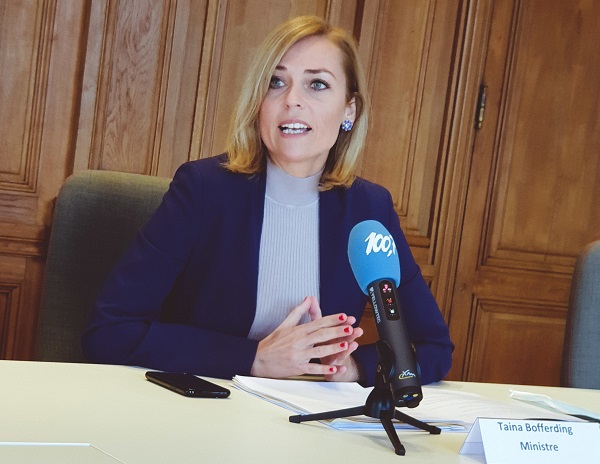 Taina Bofferding, Luxembourg's Minister of Equality between Women and Men;
Credit: MEGA
Taina Bofferding, Luxembourg's Minister of Equality between Women and Men;
Credit: MEGA
On Tuesday 9 March 2021, Luxembourg's Ministry of Equality between Women and Men presented the "Observatoire de l'égalité", a new observatory aimed at monitoring gender equality developments in the Grand Duchy.
Despite the progress made in recent years, gender inequality persists on the job market and violence and gender stereotypes continue to affect many women. To develop targeted measures and strengthen actions, the Luxembourg authorities deemed it important to have an overview of developments with figures disaggregated by sex.
The new Equality Observatory fulfils three main functions:
- provide objective data to develop political strategies;
- support the work of professionals in the field by giving them a detailed overview;
- monitor and analyse developments.
The Observatory foresees the monitoring of developments in gender equality in Luxembourg and constitutes a measure of the national action plan for equality between women and men. Equality Minister Taina Bofferding highlighted: “Ensuring equal rights also means knowing the reality on the ground and identifying the gaps. This new Observatory is an important tool for establishing a more egalitarian and inclusive society".
Background
In December 2019, the Ministry of Equality between Women and Men began setting up the Equality Observatory, in cooperation with the company GOPA. Inspired by the Gender Equality Index of the European Institute for Gender Equality, the Observatory is broken down into seven areas, namely domestic violence, employment, decision-making, work-life balance and privacy, education, income and health. The indicators will be gradually developed between now and 2023. The Observatory is based on a database with a website (observatoire-egalite.lu) intended for the general public.
Domestic violence and employment were the first areas to be implemented in 2020. These elements, coming from different administrations and organisations, will be reinforced and updated over time. The list of indicators is not exhaustive. The aim is to gradually provide an overview of gender equality in Luxembourg.
Minister Taina Bofferding pointed out the good cooperation with organisations, especially in the field of domestic violence: “The aspect of domestic violence has been put forward to collect and strengthen the available statistics. Having more figures that correspond to reality increases transparency around this societal scourge. Involving as many players as possible in the project in order to receive as much data as possible is thus a big step forward”.
The indicators relating to domestic violence provide information, for example, on police interventions, offences recorded at the time of a police intervention, victims of domestic and conjugal violence, the number of perpetrators supported by the relevant assistance service and the examinations documented by the forensic documentation of violence unit at the National Health Laboratory (Laboratoire National de Santé - LNS).
The field of employment emphasises the overall situation of equality on the labour market in general, working time, type of employment contract, segregation, unemployment, balance between professional and private life, equal pay and decision-making.
The Equality Minister stressed the importance of this work in the context of the COVID-19 crisis: “The figures confirm that there is still significant segregation of jobs by gender. Women work mainly in the fields of health and social action which are on the front line during the crisis and which will need to obtain more recognition. In terms of teleworking and work-life balance, the Observatory will play a crucial role in identifying the various impacts of the pandemic for women and men”.
Equality in decision-making will be analysed this year and will include the political field, the economy, the judiciary, the administration, civil society, sport, culture and the media. Minister Taina Bofferding noted that "equality in the decision-making process at all levels has an important leverage effect for the effective integration of the gender dimension by public authorities and is essential to improve the position of women in society". Subsequently, the Observatory will deepen the aspect of work-life balance.
In a video message, Carlien Scheele, Director of the European Institute for Gender Equality in Vilnius (Lithuania), congratulated Luxembourg's Minister of Equality for this ambitious project and assured her cooperation to perfect and optimise the Observatory in the years to come. Ms Scheele explained: “Evaluating on the basis of reliable and correct data the state of progress of equality in the Member States of the EU is essential to encourage the politicians to act in the fields for which it is urgent to act".








